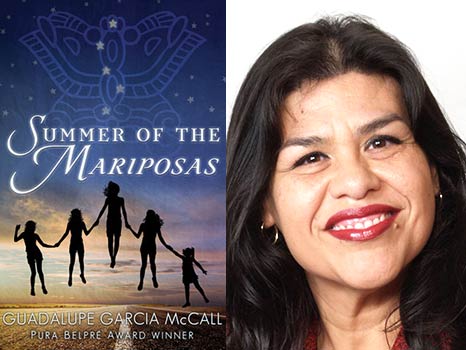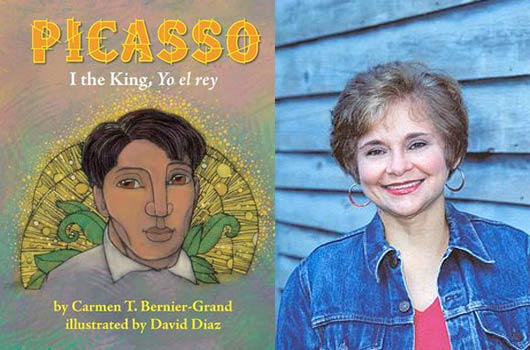 Summer of the Mariposas
Summer of the Mariposas
Guadalupe Garcia McCall
Tu Books • 2012 • 355 pages
Hardcover ($19.95)
ISBN 978-1-60060-900-8
Ages 12 and up
Mothers and daughters. As our girls grow up, the relationship becomes more difficult to navigate; we are pulled toward them one moment, pushed away the next. We want them to become independent and welcome signs of increased confidence, but we fear for their safety. This delightful book puts these struggles into a mythical framework while still managing to remain grounded.
The five Garza girls have a close bond that ties them together, and difficult family circumstances. Their handsome father, a Tejano singer, disappeared a year before, and their mother has stepped into the breach by taking a job that leaves her gone much of the day. Ranging in age between 10 and 16, the girls “go wild,” biking all over their small town and spending entire days swimming in the waters of the Rio Grande, the border (as it turns out), not just of the United States and Mexico, but of this world and another stranger world inhabited by folkloric beings.
Read Related: That Mad Game: Growing Up in a Warzone
The author states that she modeled this coming of age story on The Odyssey, and the girls’ strange journey begins with the appearance of a dead man in their swimming hole. Odilia, the eldest, wants to notify the authorities and call it a day; but Juanita, the self-proclaimed brainiac of the group, finds a wallet in the dead man’s boot with a picture of his family and an ID showing that he comes from a Mexican town some eight hours away. With the twins Velia and Delia on Juanita’s side, and little sister Pita dragged in, Odilia finds herself driving the family’s old Chevy Nova across the border—but not without supernatural help that includes La Llorona, a sometimes terrifying figure from Mexican folklore, who tells Odilia that their finding the body was not chance at all.
Beautifully intermingling Mexican folklore, religious beliefs and customs with information on the ancient Aztec culture, this riveting story of the journey from girlhood to adulthood is alternately terrifying, affecting, and laugh out loud funny. The girls are sometimes foolish, more than a little pig-headed, more trusting than they should be in some situations, and unwilling to trust in others. By the end of the story, both they and their mother are like the mariposas of the title, transformed.
In twenty-two chapters, each named for a Loteria card, this family grows on the reader. Read it and re-read it with your children. Talk about it, and you’ll be talking about life itself, that, as the author reminds us in her forward, “…however brief [is] beautiful.”
—Ann Welton, Stafford Elementary, Tacoma, Washington











